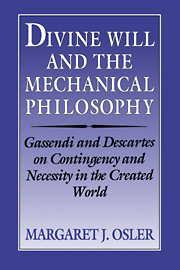 Divine Will and the Mechanical Philosophy
Divine Will and the Mechanical Philosophy Introduction
Published online by Cambridge University Press: 11 September 2009
Summary
Just as the poets suppose that the Fates were originally established by Jupiter, but that after they were established he bound himself to abide by them, so I do not think that the essences of things, and the mathematical truths which we can know concerning them, are independent of God. Nevertheless I do think that they are immutable and eternal, since the will and decree of God willed and decreed that they should be so.
René Descartes, “Replies, V”If some of the natures [of things] are immutable and eternal and could not be otherwise than they are, God would not have existed before them. Otherwise such things would not be natures … The thrice great God is not, as Jupiter of the poets is to the fates, bound by things created by him, but can in virtue of his absolute power destroy anything that he has established.
Pierre Gassendi, Disquisitio metaphysicaThis book is about ways of understanding contingency and necessity in the world and how those ideas influenced the development of philosophies of nature in the seventeenth century. Is the world contingent on forces beyond the possibility of human understanding and control? Or does the world necessarily conform to rationally intelligible principles? The interplay between these conceptions goes back to both the Greek and the Hebrew sources of Western thought, forming an important strand in the long history of the relationship between Athens and Jerusalem.
- Type
- Chapter
- Information
- Divine Will and the Mechanical PhilosophyGassendi and Descartes on Contingency and Necessity in the Created World, pp. 1 - 12Publisher: Cambridge University PressPrint publication year: 1994


